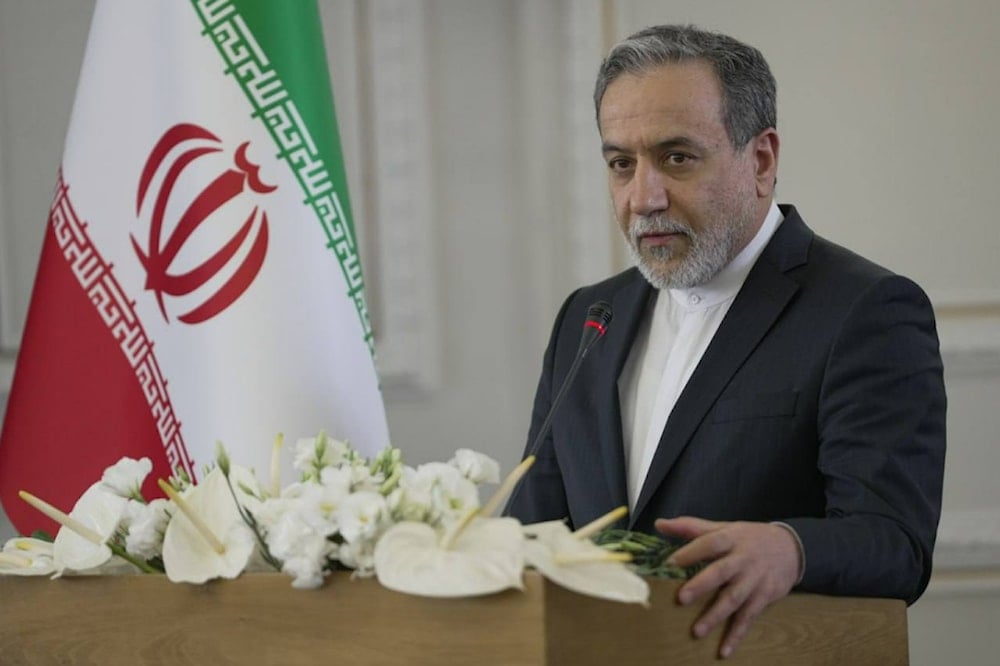Iran unveils vision for homegrown West Asian security framework
Iranian FM Abbas Araghchi lays out a bold vision for a sovereign, cooperative West Asia rooted in regional consensus, not foreign domination, denouncing "Israel’s" genocidal role as the main obstacle to lasting peace and security.
-

Commemoration ceremony of the first anniversary of the martyrdom of Martyr Amir-Abdollahian and the martyrs of service at the Ministry of Foreign Affairs (Official Telegram channel)
Iranian diplomat Abbas Araghchi has laid out a comprehensive roadmap for transforming West Asia's fractured geopolitical landscape into a cooperative and sovereign-driven regional order. In a policy essay titled "Constructing a New Regional Reality: Toward Stability, Sovereignty, and Solidarity in West Asia," Araghchi calls for a decisive break from foreign-imposed models and calls for the implementation of inclusive, locally led solutions.
The region, he argues, is grappling with interconnected crises ranging from wars and economic collapse to climate stress and widespread displacement. These challenges, intensified by decades of foreign interference and environmental neglect, have left millions in precarity, without agency over their futures.
"Reality, in West Asia as elsewhere, is not fixed, it is forged through agency, consensus, and vision," Araghchi states, urging regional actors to reject inherited assumptions and take ownership of their shared destiny.
He contends that only through dialogue, mutual recognition, and regional responsibility can West Asia transition from instability to resilience. Iran, he says, sees regional threats, from terrorism to cyber warfare and climate-induced migration, as collective issues requiring collective responses. A region marked by sanctions, warfare, and sectarian division, Araghchi argues, cannot prosper unless it embraces a cooperative approach.
Regional sovereignty
Araghchi criticizes externally designed security systems for failing to account for the region's political and cultural complexity. "Few external powers have ever made a lasting or genuinely constructive contribution to West Asia's stability," he writes, asserting that such interventions tend to reflect "the strategic calculations of distant capitals rather than the lived realities of people in Tehran, Baghdad, Riyadh, or Damascus."
Read more: EU greenlights lifting of all economic sanctions on Syria
He presents Iran's position as one of regional engagement, not domination, pointing to initiatives such as the Dialogue Among Civilizations, the WAVE initiative, and the Hormuz Peace Endeavor (HOPE) as reflections of Tehran's longstanding diplomatic vision. These proposals emphasize collaboration based on common heritage and mutual respect.
Araghchi welcomes recent developments such as the Gulf Cooperation Council's 2024 regional security document, describing it as "a foundational step toward a cohesive regional security order" and evidence that other states are beginning to recognize their interdependence.
Addressing broader development challenges, he advocates for an expanded definition of security that includes environmental protection, public health, and economic equity. "Human security must become the cornerstone of any future regional architecture," he writes, stressing the need for transnational coordination on climate, education, and crisis response.
Imposed obstruction
A central component of Araghchi's essay is a pointed critique of "Israel's" role in undermining regional peace. "Israel's posture in the region has turned it into a perpetual objector, a state that consistently and structurally opposes initiatives for collective security and disarmament," he writes. He denounces "Israel's" refusal to join global arms control agreements, calling its nuclear weapons policy "a doctrine of deliberate ambiguity."
The essay further condemns "Israel's" actions in Gaza, the West Bank, Lebanon, and Syria, stating, "From genocide to crime against humanity, from the ongoing siege of Gaza and the expansion of illegal settlements in the West Bank, to repeated incursions into Lebanon and its role in the occupation and destabilization of Syria, Israel has pursued a strategy rooted in impunity."
Read more: Regional security will be at risk if Iran attacked: Chief of Staff
Araghchi concludes by calling on global powers to respect the sovereignty of West Asian nations and support frameworks driven by regional consensus. "The future of West Asia will not be forged in foreign capitals. It will be authored by the region's peoples," he writes, proposing a shift from reactive diplomacy to proactive regional partnership.
He envisions a future built on shared security, reciprocal sovereignty, and peace born not of dominance, but of solidarity and mutual respect.

 4 Min Read
4 Min Read








